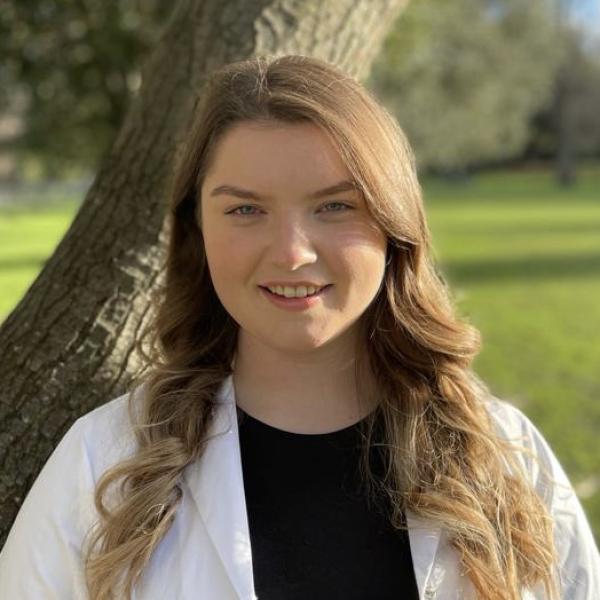Translational Research Summer Studentships
The Translational Research Summer Studentship programme offers undergraduate students the opportunity to undertake a cancer research project and to work with established researchers in high-quality academic environments.
The winners of the 2020 Translational Research Summer Studentship write about their research and why they applied for the programme.
Due to COVID-19 restrictions, these projects were delayed.

- Researcher: Megan McAuley, BSc Biological & Biomedical Sciences, Maynooth University
- Project: ‘Inhibition of natural killer cells by tumour-derived complement in oesophageal adenocarcinoma’
Oesophageal adenocarcinoma (OAC) is a cancer of the oesophagus. It is associated with obesity and as rates of obesity rise globally, so does the rate of OAC. Unfortunately, 70% of people with OAC do not respond well to the standard treatment of chemoradiation therapy. We say these people have ‘radio-resistant OAC’. In this project we are trying to understand why radio-resistance happens.
Natural killer (NK) cells are a type of white blood cell that find and destroy cancer cells. They also play a role in the response to chemoradiation therapy. Unfortunately, cancer cells from patients with radio-resistant OAC seem to hide from NK cells. We think that the cancer cells hide by producing molecules called complement proteins, which interfere with NK cells. This could be what causes radio-resistance.
In this study I want to see if blocking complement proteins can help NK cells to find and destroy cancer cells again. By understanding how radio-resistance occurs, I hope to find new ways to improve treatment for people with OAC. My results will impact on the academic understanding of OAC and inform future treatment strategies to improve response rates in the long term, not only in OAC but also in other cancers where chemoradiation therapy is used.
- Why did you apply for the Irish Cancer Society studentship programme?
I applied for the Irish Cancer Society studentship programme as I was interested in improving my laboratory research and experimental planning skills, which are invaluable to my career. Cancer is so complex and there are so many unknowns – it would be great to contribute even a small amount of knowledge to this area. - What made you interested in the topic of your research?
Like so many others, I have seen first-hand the impact that cancer has on patients and their families. This led to a personal interest in cancer research, especially in the role of research in developing new life-saving therapies for patients. The recent advancements in this area are incredible and re-enforced my desire to work in this field. - What do you personally hope to get out of the studentship?
I hope to improve my skills as a translational research scientist, particularly my practical skills. This is an exciting opportunity for me to use all I have learned about cancer and immunology throughout my degree in a laboratory setting. It is also a great chance to support the Irish Cancer Society. - What impact you hope your research will have?
I hope that my research will improve treatment options for people affected by oesophageal adenocarcinoma and possibly other cancers.

- Researcher: Claire Hughes, BSc Cell and Molecular Biology, University College Dublin
- Project: Cellular Senescence: A target for disruption in ovarian cancer.
In Ireland, over 400 women are diagnosed with ovarian cancer each year, with 65% dying within 5 years of their diagnosis. Ovarian cancer is treated with two chemotherapy drugs, carboplatin and paclitaxel. However, despite these treatments, ovarian cancer can often come back (recurrence). When ovarian cancer recurs, it may not respond to treatment (resistance). This resistance to treatment is a major cause of the significant mortality rate of ovarian cancer.
A number of recent studies in ovarian cancer identified that when patients have low levels of a protein called MAD2, their cancer is going to come back quicker than others and they may not survive as long. Suppression of the MAD2 protein is a mechanism used by cancer cells to become resistant to the chemotherapy drug, paclitaxel.
The goal of my project is to attempt to overcome this resistance mechanism using a new therapy called metformin, which historically has been used as a diabetes medication and has already been shown to enhance survival rates in ovarian cancer. We think that specific subsets of patients with low levels of the MAD2 protein will benefit especially from use of metformin in conjunction with normal chemotherapy.
- Why did you apply for the Irish Cancer Society studentship programme?
I applied for the Irish Cancer Society studentship programme because I wanted to improve my laboratory and research skills, as well as network with researchers focusing on ovarian cancer. I hope to pursue a PhD in ovarian cancer research and this studentship will give me a great insight into a career in cancer research. - What made you interested in the topic of your research?
I lost my Mom, Vivienne to ovarian cancer when I was sixteen years old. I know first-hand what it’s like to see a loved one lose their battle with cancer, and so I decided to take the pain of losing my Mom and channel that pain and loss into something positive. I want to make an impact on the lives of the many women diagnosed with ovarian cancer by dedicating my career to this cruel disease. - What do you personally hope to get out of the studentship?
I hope to improve my laboratory and research skills that I will apply to my future career in cancer research, as well as gaining an insight into the current areas of research in ovarian cancer.
I am honoured to be a part of the Irish Cancer Society community, whose work has a tremendous impact of the lives of those affected by cancer. - What impact do you hope your research will have?
Resistance to treatment is a major cause of the high mortality rate associated with ovarian cancer. Therefore, developing mechanisms to overcome this resistance is paramount to improving patient care and survival for women diagnosed with ovarian cancer. I hope to overcome this resistance to treatment by using the therapy, metformin in conjunction with chemotherapy for a subset of patients with low levels of the MAD2 protein, which may lead to improving survival for these patients.
For more information
Phone
1800 200 700
